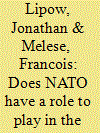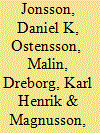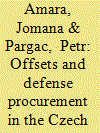|
|
|
Sort Order |
|
|
|
Items / Page
|
|
|
|
|
|
|
| Srl | Item |
| 1 |
ID:
093081


|
|
|
|
|
| Publication |
2009.
|
| Summary/Abstract |
This paper emphasizes the pertinence of the British government's claim that nuclear deterrent threats are still relevant in the four broad areas to which it addresses: deterrence against aggression towards British/NATO vital interests or nuclear coercion/ blackmail by major powers with large nuclear arsenals; deterrence against nuclear coercion or blackmail with other WMD by regional ''rogue'' states; deterrence against state-sponsored acts of nuclear terrorism; and as a general residual deterrent function to preserve peace and stability in an uncertain world.
British nuclear weapons are still important and very much relevant in all the four areas discussed. First of all, they play a role of a significant tool of political leverage as they continue to serve as an authentication of British military capabilities. In that regard, they still function much the same way they did during the 'Cold War'. WMDs were, after all, a guarantee of their non-use, which does not mean that they were not useful. Secondly, it also authenticates the UK among its allies. Even though generally democracies do not wage wars with one another, they still have to face the challenges posed by non-democracies. In doing so, they need to support each other with the use of 'ultima ratio' arguments in order to safeguard international peace and stability. The British nuclear deterrent should, therefore, be perceived as a general deterrent with a positive influence on international community and international security, overall.
|
|
|
|
|
|
|
|
|
|
|
|
|
|
|
|
| 2 |
ID:
093077


|
|
|
|
|
| Publication |
2009.
|
| Summary/Abstract |
The financial crisis endangers the security of NATO's members and partners. As such, NATO has a formal obligation to mobilize its resources to aid members in overcoming current economic challenges. NATO can play a valuable role on three levels. First, NATO can aid members in rationalizing their military procurement and manpower systems, thus reducing the fiscal burden of maintaining adequate defenses. Second, NATO can press the ECB and the EU to modify arrangements governing the Euro so as to minimize the risk that EMU will collapse. Finally, NATO has a "soft power" role in vigorously defending the liberal economic order and democratic political institutions of the Western Alliance from the ideological attacks that inevitably follow financial crises.
|
|
|
|
|
|
|
|
|
|
|
|
|
|
|
|
| 3 |
ID:
093076


|
|
|
|
|
| Publication |
2009.
|
| Summary/Abstract |
The competition for energy resources, as well as the closely related climate change problems, imply a number of global security consequences. A methodology to include energy aspects in long-term defence planning, based on broad civilian scenario approaches, is proposed. The study has been carried out by the Swedish Defence Research Agency, as commissioned by the Swedish Armed Forces, resulting in a number of future mission scenarios highlighting e.g. new challanges and tasks, as well as the need for new capabilities and equipment.
|
|
|
|
|
|
|
|
|
|
|
|
|
|
|
|
| 4 |
ID:
093079


|
|
|
|
|
| Publication |
2009.
|
| Summary/Abstract |
This study examines the issues the Czech Republic faces in implementing defense offsets. The paper will briefly outline the history of the Czech Republic's participation in offsets and its current policy towards offset practices. The Czech Republic is a NATO, as well as EU, member and therefore is obliged to follow policies implemented by these institutions. The offsets for the Gripen Program will be used to illustrate the implementation of defense procurement offsets by Czech Republic MoD under its Industrial Participation Program.
|
|
|
|
|
|
|
|
|
|
|
|
|
|
|
|
| 5 |
ID:
093073


|
|
|
|
|
| Publication |
2009.
|
| Summary/Abstract |
One of the contemporary arguments made in support of fielding revolutionary military technologies is that technological dominance not only decides the outcome of major wars, but enhances a nation's coercive power in dealing with low-end threats. Currently, a new generation of technophiles claims that unmanned and robotic systems are revolutionizing warfare, increasing the ability of advanced states to coerce states and societies that lag behind. Yet historically, technological dominance at the tactical level has a mixed record when projected into the diplomatic realm. The article analyzes the effectiveness of low-risk, over the horizon coercion from an historical viewpoint, assessing the effectiveness of gunboat diplomacy, air policing, and the 'Tomahawk diplomacy' of the 1990s. The author claims that the historical record indicates that gunboat diplomacy, air policing, and over the horizon coercion is more problematic than commonly portrayed, with the boundaries between coercive diplomacy and savage small wars both porous and slippery.
|
|
|
|
|
|
|
|
|
|
|
|
|
|
|
|
|
|
|
|
|